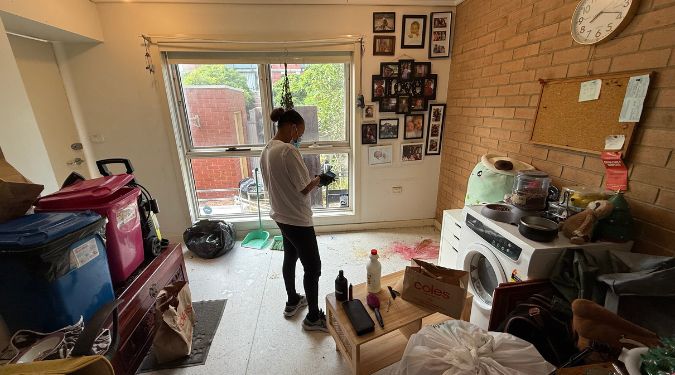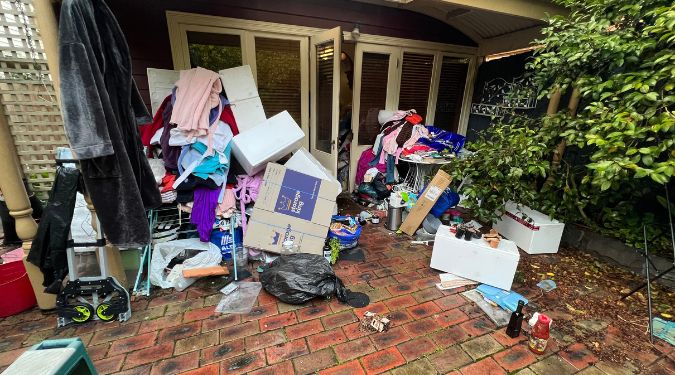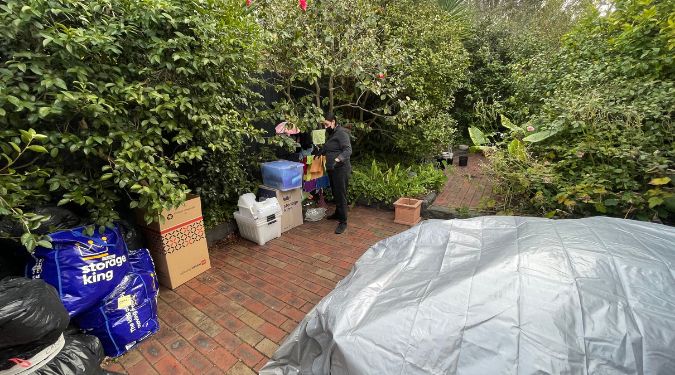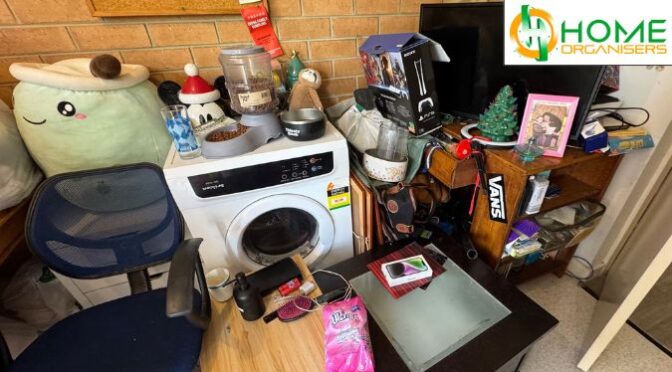Introduction: More Than Just a Mess
For many NDIS participants, clutter is not simply about having too many things. It can be a hidden roadblock that stops progress in everyday life. Whether it’s piles of paperwork, unused furniture, or years of belongings stacked up in hallways, clutter barriers can get in the way of living well — and it often gets overlooked in support plans.
This blog explores why decluttering matters deeply for health, happiness, independence, and overall NDIS goal achievement. We’ll cover it from several angles — physical health, mental wellbeing, emotions, family life, safety, productivity, mood, wealth, and more. We’ll also explain why decluttering is not just a one-time clean-up, but a long-term support that can change lives.
Physical Health: Clutter Can Be a Hazard
A cluttered home can pose real risks to safety. Tripping over bags, bumping into furniture, or reaching over stacked items can cause injuries — especially for people living with mobility issues, vision impairments, chronic pain, or fatigue.
For example:
- A walker or wheelchair may not fit through a cluttered hallway.
- Medication might get lost under piles of clothes.
- Spills may go unnoticed and cause slips.
By removing clutter, we reduce the chances of injury and create more space for safe movement. Decluttering also allows better airflow and light, which can reduce dampness, mould, and dust — all of which affect breathing and general health. This creates a safer and more functional environment NDIS participants can thrive in.

Mental Health: A Clear Space Supports a Clear Mind
Clutter barriers affect the way we think and feel. When a space is full of mess, the brain feels overwhelmed. It can be harder to focus, make decisions, or relax. For NDIS participants living with anxiety, depression, PTSD, or autism, clutter can make symptoms worse.
Why?
Because the brain is constantly processing what it sees. When it sees piles of “stuff,” it feels unfinished, out of control, or chaotic. This can cause feelings of:
- Guilt (“I should have cleaned this up.”)
- Shame (“Why is my place like this?”)
- Frustration (“I can’t find anything!”)
- Hopelessness (“It’s too much to deal with.”)
Decluttering helps create calm. A clean and tidy space gives the brain a break and reduces stress. This contributes directly to NDIS goal achievement in areas related to emotional regulation and wellbeing.
Emotional Health: Letting Go With Support
Decluttering isn’t just about throwing things out. It’s also about working through emotions. Many NDIS participants have items that are tied to memories, relationships, or past versions of themselves. Some may have trauma connected to loss, grief, or instability.
This is why clutter barriers must be addressed gently and respectfully. With the right support, participants can feel safe as they:
- Decide what’s important to keep
- Say goodbye to things they no longer need
- Reclaim ownership over their space
A good decluttering support worker doesn’t force decisions. They work alongside the person with kindness, care, and patience.
Family and Social Life: Restoring Connection
Clutter barriers can cause embarrassment. Many people stop inviting friends, family, or support workers into their homes because they feel ashamed of how it looks.
This can lead to:
- Loneliness
- Isolation
- Relationship stress
- Missed supports or check-ins
On the other hand, a clean, welcoming home encourages connection. It becomes a place where others feel safe to visit, and the participant feels proud to host them. It can even help family relationships improve, as the home feels more peaceful and manageable — a more functional environment NDIS participants can enjoy with others.

Productivity and Independence: A Tidy Space Supports Daily Living
When things are lost, hard to reach, or buried under clutter, it’s difficult to complete even basic tasks. This includes:
- Preparing meals
- Getting dressed
- Taking medication
- Attending appointments
- Cleaning or doing laundry
This creates reliance on others, lowers confidence, and holds people back from gaining independence.
Decluttering puts control back in the hands of the participant. It becomes easier to:
- Know where things are
- Stick to routines
- Prepare for the day
- Use appliances and equipment
- Handle tasks alone or with light support
NDIS participants often have goals around gaining life skills, building routines, or living independently — and these goals are much easier to reach in an organised, functional environment NDIS homes are meant to provide.
Mood and Motivation: The Power of Small Wins
Every item that’s sorted, stored, donated, or removed feels like a small victory. These small wins can build momentum. Many NDIS participants feel stuck or stuck-in-a-rut. Decluttering can be the circuit-breaker they need to start fresh.
A clean room can lead to:
- Feeling proud
- Feeling “lighter”
- Wanting to keep going
- Better sleep
- More energy to do other things
The space itself begins to feel more uplifting — like a place of rest, purpose, and pride. These are important steps toward NDIS goal achievement, especially for participants working on motivation, mood, or engagement in daily life.

Wellbeing and Quality of Life: It’s About More Than Clean Floors
At the heart of every NDIS plan is this simple question: “How can we support this person to live their best life?”
Clutter barriers get in the way of that. They:
- Cause daily stress
- Lower self-esteem
- Delay progress
- Make home life harder
- Hide potential
Decluttering removes those blocks. It helps people feel better in their space, about their space, and about themselves, opening the door to greater NDIS goal achievement.
Wealth and Cost: Clutter Can Be Expensive
Yes, clutter costs money — and not just in the obvious ways.
People with cluttered homes often:
- Buy replacements for things they already own but can’t find
- Waste food because it’s buried or forgotten
- Pay for storage they don’t use
- Spend more on healthcare due to falls or illness from poor air quality
- Lose bills or letters that result in late fees
Decluttering helps reduce waste and saves money in the long run. It also helps participants become better organised with budgeting, bills, and paperwork — all of which contribute to a more stable, functional environment NDIS participants can manage confidently.
Accessing Other Supports: A Clear Home Allows Other Services to Work
If a support worker, nurse, or therapist can’t do their job properly due to clutter barriers, the participant isn’t getting the full value of their NDIS plan.
For example:
- An OT might not be able to assess home modifications if they can’t see the layout
- A physio might not be able to guide exercises if there’s no clear floor space
- A support worker might skip visits due to hazards or access issues
Decluttering opens the door for other services to be delivered properly. It also reduces cancellation risks and keeps the participant moving forward toward NDIS goal achievement.
Dignity and Choice: Participants Deserve to Feel Proud of Their Home
Everyone deserves to feel at ease in their own home — especially NDIS participants, whose lives often involve a range of challenges.
Clutter barriers can take away a person’s sense of dignity. It may not feel like “home,” but more like a storage room or obstacle course.
When participants are supported to declutter:
- They reclaim their space
- They feel respected and in control
- Their home reflects who they are and what they value
This shift is empowering and life-affirming — and a vital part of creating a safe, functional environment NDIS participants can take pride in.
Tailoring Decluttering to NDIS Goals
Decluttering isn’t just “extra help.” It can directly support NDIS goal achievement across multiple areas, such as:
- Improved daily living: Support with routines, cooking, self-care
- Social and community participation: Creating space to invite others in
- Coordination of supports: Making home more functional for all services
- Health and wellbeing: Reducing anxiety, injury, and stress
- Lifelong learning or employment: Having an organised space for study or work
With the right provider, decluttering sessions are goal-driven, person-centred, and done with respect and collaboration.
How Decluttering with Home Organisers Works
At Home Organisers, we work with participants all across Australia. We are a registered NDIS provider specialising in decluttering for people living with disabilities, chronic illness, neurodiversity, or mental health challenges.
We take a supportive, step-by-step approach:
- Listen: We learn about your goals and needs.
- Plan: We agree on what areas to focus on first.
- Support: Our friendly team works side-by-side with participants.
- Respect: We never throw away anything without permission.
- Encourage: We celebrate small wins and progress over perfection.
We’re here to help participants feel confident and in control — not judged or rushed. Every project is shaped to build a more peaceful, functional environment NDIS participants can thrive in.
Conclusion: Decluttering Is the Foundation for Growth
If your client or someone you care for is struggling with clutter barriers, know this: It’s not laziness. It’s not failure. It’s a sign that they may need a little help to get back on track.
Decluttering can be the missing link in an NDIS plan. It can help unlock access to other supports, improve health, build confidence, and create a living space that feels truly safe, functional, and empowering.
At Home Organisers, we believe everyone deserves a fresh start — and sometimes, that starts with a clear room and a helping hand.
Ready to support your client’s NDIS goals with a safer, more functional home?
Contact us today to learn how our compassionate decluttering services can help.
Call Nancy on 03 8583 9103
Email: nancy@homeorganisers.com.au
Visit: https://homeorganisers.com.au
Case Study 1: Rebuilding Daily Routines After Trauma — Sarah’s Story
Background
Sarah, a 42-year-old participant living with PTSD and chronic fatigue syndrome, had been approved for a range of supports under her NDIS plan. While she had regular visits from a support worker, a psychologist, and an occupational therapist, she wasn’t progressing toward her goals. Her morning routine remained inconsistent. She was missing medical appointments. Her anxiety levels were increasing — and no one could pinpoint the cause.
The Challenge
Upon a routine check-in, Sarah’s support coordinator visited her home and noticed extreme levels of clutter — including unopened mail, stacked clothing, boxes blocking access to windows, and food items well past their expiry date. The support worker admitted they were unable to assist Sarah properly due to the limited space and potential safety risks.
The home environment had become a silent saboteur. It was clear that clutter barriers were blocking her NDIS goal achievement — especially in areas such as daily living skills, meal preparation, and emotional regulation.
The Solution
The support coordinator reached out to Home Organisers, and a decluttering service was quickly approved under Sarah’s Core Supports. We began with a respectful consultation, focusing on Sarah’s comfort and choices. She was nervous at first, having strong emotional ties to many of the items in her home.
Our team worked slowly and gently — creating simple routines, assigning zones to each space, and empowering Sarah to make her own decisions. Over six weeks, we transformed her home into a safer, more open, functional environment NDIS supports could be delivered in.
The Outcome
The results were profound:
- Sarah began preparing simple meals again
- She attended all her medical appointments for the first time in months
- Her support worker could finally assist with home care tasks
- She reported lower anxiety levels and improved sleep
Most importantly, Sarah’s confidence began to grow. Decluttering didn’t just clean her space — it reignited her sense of control and independence. It became the missing piece in unlocking her NDIS goal achievement.
Case Study 2: From Isolation to Independence — Tom’s Journey to a Functional NDIS Home
Background
Tom is a 59-year-old NDIS participant living with acquired brain injury and mobility challenges. He had one key goal in his NDIS plan: to increase his independence and reduce reliance on family members for everyday tasks. He wanted to eventually live with minimal in-home support.
Although Tom had access to domestic assistance and coordination services, he was not making progress. His family noted that his motivation was low, and he seemed resistant to change. He had stopped inviting people over. His living room, once a social hub, was no longer usable.
The Challenge
A functional assessment revealed that Tom’s living space was cluttered with piles of paperwork, outdated electronics, and furniture he no longer used. The kitchen counters were inaccessible, and his walker didn’t fit comfortably in narrow passageways.
This clutter wasn’t just untidy — it was acting as a clear clutter barrier to Tom’s independence. Even his support coordinator had begun to reduce visits, citing safety concerns.
Tom’s NDIS goal achievement was being stalled not by a lack of resources, but by an environment that was working against him.
The Solution
Home Organisers stepped in to work with Tom under his Capacity Building budget. The approach was framed around one clear benefit: helping Tom get back to doing more on his own.
Together, we created a room-by-room plan. Items were sorted into categories: keep, donate, store, or dispose. We involved Tom every step of the way, always giving him the final say. As the clutter cleared, Tom’s pride in his home began to return.
We also worked with his OT to ensure layout changes supported better movement and safety — turning his home into a truly functional environment NDIS supports could work with, not against.
The Outcome
- Tom now prepares his own breakfast and lunch every day
- He began inviting his brother and niece over for short visits
- His mood improved noticeably — he started smiling more during check-ins
- His support hours were restructured, as he no longer needed the same level of daily assistance
By removing the clutter barriers, Tom finally had the space — physically and mentally — to grow into the independent lifestyle he had always wanted.
A gentle guide for support coordinators and carers on how to raise the topic of clutter in a way that feels respectful, empowering, and trauma-aware. Understanding how clutter can quietly block NDIS goal achievement — and how to remove this hidden obstacle with the right support. A supportive FAQ that explains how Home Organisers takes small, manageable steps to make the process feel safe and stress-free for participants. Exploring the emotional and practical impact of a clearer space — especially for participants living with anxiety, autism, depression, or trauma. A look at how NDIS-funded decluttering is goal-focused, participant-led, and designed for long-term change — not just a one-time tidy-up. Step-by-step guidance for support coordinators on how to request and include decluttering services under Core or Capacity Building supports. Real stories and examples of how a clutter-free environment can support cooking, personal care, social visits, and everyday living goals. A behind-the-scenes FAQ showing how OTs, physios, support workers, and cleaners all benefit from a safe, accessible space. A warm, emotional blog about how clearing clutter can also clear the way for deeper social connection and pride in their living space. A friendly, detailed walkthrough of what to expect, from the first phone call to the last item sorted — reassuring for both participants and coordinators.Decluttering & NDIS: Answers to Common Questions About Home Organisation Support



